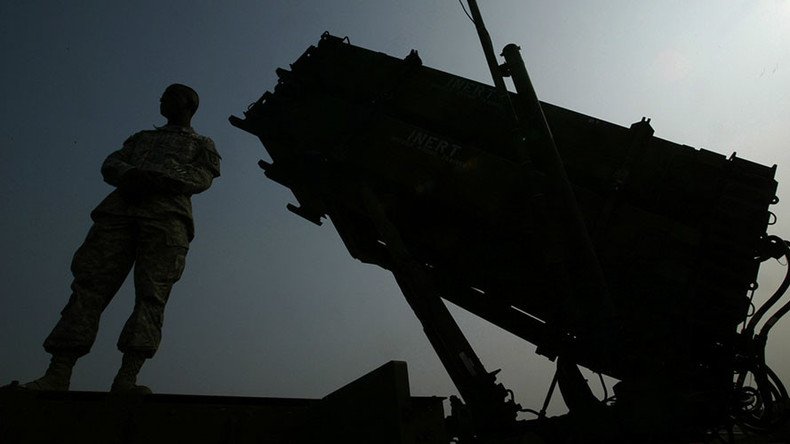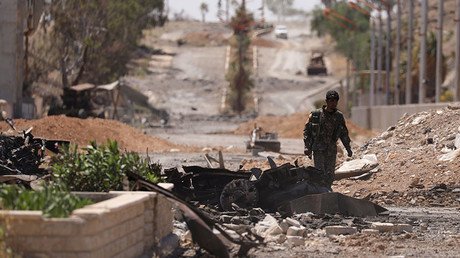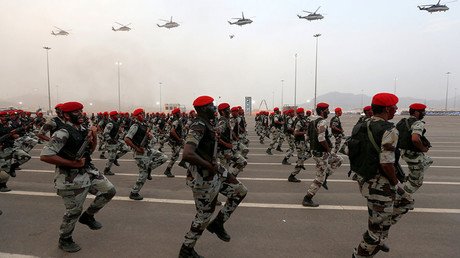$110bn US-Saudi arms deal sent to Congress, seen as way to protect Middle East allies

The path for the US to resume its sale of precision-guided munitions to Saudi Arabia has been cleared as Secretary of State Rex Tillerson has authorized the State Department to notify Congress of the pending transaction.
The notification occurred before Tillerson joined President Donald Trump on his first presidential trip abroad, a senior State Department official said on Tuesday. It is one of the last steps of the process for arms sales, and it triggers a formal 30-day congressional review. US lawmakers can use that time to pass legislation to block all or part of the deal.
Last Thursday, a bipartisan group of lawmakers introduced a joint resolution of disapproval of a small part ‒ $500 million ‒ of the $110 billion deal. Senators Rand Paul (R-Kentucky), Chris Murphy (D-Connecticut) and Al Franken (D-Minnesota) have to wait 10 days before they can bring their bill up on the Senate floor, in accordance with a provision of the Arms Export Control Act.
A similar measure introduced by the same three senators and Sen. Mike Lee (R-Utah) was overwhelmingly rejected by the upper chamber last year.
Also on Thursday, Representatives Ted Lieu (D-California) and Ted Yoho (R-Florida) wrote a letter to the House Foreign Affairs Committee calling on the government to reconsider the delivery of the precision-guided munitions. They argued that it was important to first understand if the Saudi Air Force, which spearheads the kingdom’s invasion of neighboring Yemen, would be able to use the cutting-edge armaments in their strikes against Shia Houthi militias.
International human rights organizations have long voiced concerns over the Saudi-led coalition’s attacks in Yemen, where Riyadh is fighting against Houthi rebels and supporters of the former Yemeni president, Ali Abdullah Saleh, who are allegedly backed by Iran. Concern that the Royal Saudi Air Force was targeting civilians in Yemen led President Barack Obama to halt the sale of precision-guided munitions to Saudi Arabia during his last month in office.
Not including that canceled sale, the US offered Saudi Arabia $115 billion worth of arms in 42 separate deals during Obama’s two terms, according to a September report from the Center for International Policy, a US-based anti-war think tank. It estimated that US arms offers to Saudi Arabia were more than any US administration in the history of the US-Saudi relationship.
Saudi arms imports up 212% amid Yemen campaign - Stockholm International Peace Research Institute https://t.co/6b4TvBLkYz
— RT (@RT_com) February 20, 2017
The Trump administration seems far less concerned about potential human rights abuses than its predecessor, focusing instead on the overall security of the region.
“In addition to supporting the long-term security of Saudi Arabia and the Gulf,” State Department spokeswoman Heather Nauert told reporters, the deal “will bolster the kingdom’s ability to contribute to counterterrorism operations across the region, and that will reduce the already heavy burden on the United States.”
The deal will help protect the region from the threat of Iran, acting Assistant Secretary of State for Near Eastern Affairs Stuart Jones said during Tuesday’s State Department briefing, noting that, on the day of the Gulf Cooperation Council summit, a ballistic missile was shot into Saudi Arabia from Yemen, “presumably by the Houthi forces.”
“So we want our security partner, the Saudis, to have the – what they need to secure their borders and to secure their region, and also to send a strong message that we will stand by our security partners,” Jones said. “We are constantly discussing quietly our understandings with the Saudis about how these are going to be used. We provide a lot of technical assistance about how these systems are going to be managed.”
During the briefing, Jones was asked about critics who complained that Trump did not call out Saudi Arabia’s history of human rights abuses or its promotion “Wahhabi or extremist visions of Islam.” Jones noted that those discussions occurred during bilateral meetings with the Saudi government.
“You can argue that by taking it out of the public debate and having those conversations directly and quietly, [it] will be more effective,” he added.
The $110 billion arms deals includes $6 billion for Lockheed’s Black Hawk helicopters, which is “a done deal, that’s fixed,” Jones said. It also includes memoranda of understanding and letters of intent that “haven’t been concretized, but will be.”
Trump and the Saudis also signed $80 billion in commercial agreements, which include $12 billion in General Electric power plants, as well as $20 billion the Saudis have committed to Blackstone Group for investment in infrastructure in the US.
Jones couldn’t comment on how many of the deals were already in the works as opposed to new agreements struck by the Trump administration because the State Department hasn’t “racked and stacked those.”














